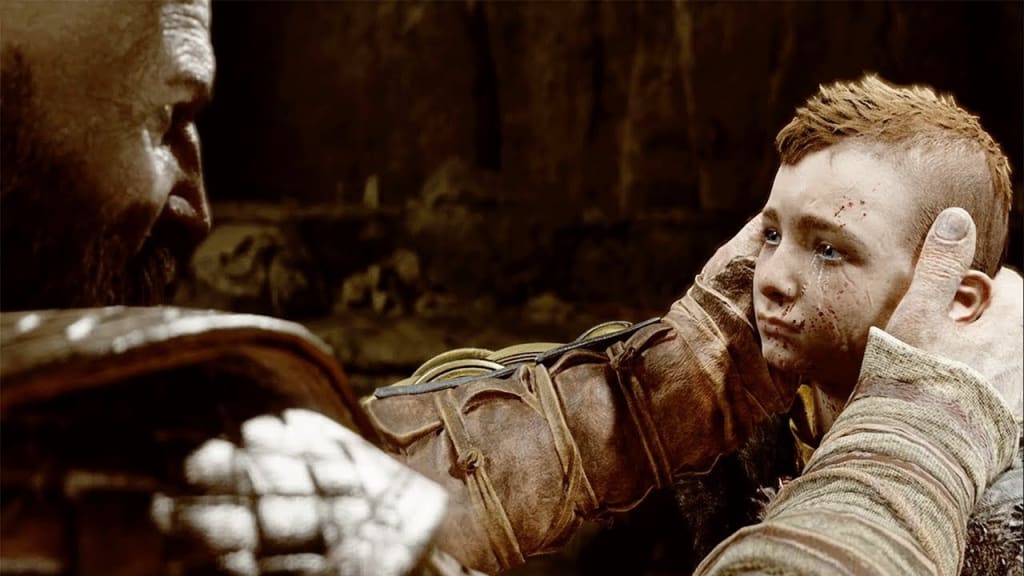How 'God of War' Creates Dynamic and "Human" Gods
Exploring How One of the Newest Triple a Games Presents the Difficulties in Coming to Terms With Who You Are, and the Struggle of an Ever-Changing Father-Son Relationship

Throughout the God of War franchise, gamers following Kratos’s journey will recognise him as a brutal Spartan God who shows little mercy to those he believes have wronged him, and enjoys basking in the sheer power that he possesses.
In this installment, however, the game takes a turn for the more sensitive (if it could even be called that) approach to Kratos. Leaving his past as a Spartan God behind, the game picks up with beautiful imagery and gorgeous landscapes following the death of his lover and mother to his son, Faye.
I see what you’re thinking, and yes, it usually is the case—a parental death or death of somebody close to you is the typical trope that creates a protagonist, and I agree, to some extent. During the first moments of the game, I too almost felt obliged to an eye-roll. However, it’s this key moment that sets up much of the dynamic relationship between Atreus and Kratos.
Santa Monica studios create a distant Kratos in the beginning, and we see him being almost overly critical of his son, referring to him as “boy” instead of something more indicative of their relationship, like “Son,” or even his name. This seemingly barren relationship sets the stage for a vast exploration as the game progresses.
Until the half-way point, Atreus’s belief that both he and his father are mortal offers for complex exploration of the danger of keeping secrets from the ones you love. Even by the characters you meet in the form of Freya and Mimir, you are told as Kratos that your hatred of all Gods includes him, and your son can feel it, showing Kratos’s evaluation of his own actions and how he views himself and his son.
Leading up to the tense reveal, we see Kratos reflect on his relationship with Atreus. Following his first kill, we see the lesson that so many games with successful relationship building have created within their stories— forget innocence, because the world is cruel. In teaching his son this, he paves the way for mutual understanding between the two. Kratos becomes focused on not coddling his son, but teaching him how to protect himself; teaching him how to be a man and not a monster.
Kratos himself even goes as far as to tell his son to “be better” than himself when he finally reveals their identity as Gods. However, it could be argued that the way he conceals his true identity only makes way for more trouble, as Atreus starts to become frustrated with being lectured by a God who he doesn’t know understands the path he’s going down, up to demanding to know how Kratos knows the consequences of killing a God. Atreus even takes a drastic character turn, becoming over-confident and having a superiority complex over people he once had respect for; namely Sindri and Brok.
Ultimately, the game becomes a lesson for Kratos that in trying to protect his son, he put him in the path of more danger. Yet in accepting that his son is his own God, and allowing time for a growth in character and mutual respect in their relationship, he allows Atreus to find his own path to becoming safe and secure in his own right, instead of being hidden away and concealed for the rest of his days.
Showing the shifts between conflicts of interest, showing Kratos’ wisdom against Atreus’ stubborn naïveté, and showing how struggle and challenge treads a thin line of either bringing family closer together or tearing it out from the roots, God of War creates a dynamic and recognisably human experience of a relationship that any player can understand and empathise with. As Kratos, the player may feel the pressure of protection, yet struggle in finding the balance of letting his son come into his own, giving them the shared experience with the protagonist on his struggle through single parenthood and how to be a “good” father to his son.
Practically begging his son not to turn into himself, he toys with the ideas of idolization of a parent and the wish to be like them, but the struggle to push both parents and children alike to avoid this and create their own identity. Kratos as a father displays the inner fears of many people in letting their loved ones down and being a symbol of disappointment, rather than of security, but in exploring the highs and lows of this father and son relationship, God of War allows players to know that it’s just a part of life, and often these fears are never met with any truth.
The most important lesson? The things you think are protecting the ones you love sometimes end up causing more damage, so the best thing you can be is honest and allow for change to happen. This doesn’t mean that challenges won’t come, but you will be better equipped to tackle them when they do.





Comments (1)
This game is really great. It's really good that it's available on steam. If anyone is looking for a good store with this game, I recommend this store: https://royalcdkeys.com/products/god-of-war-steam-cd-key